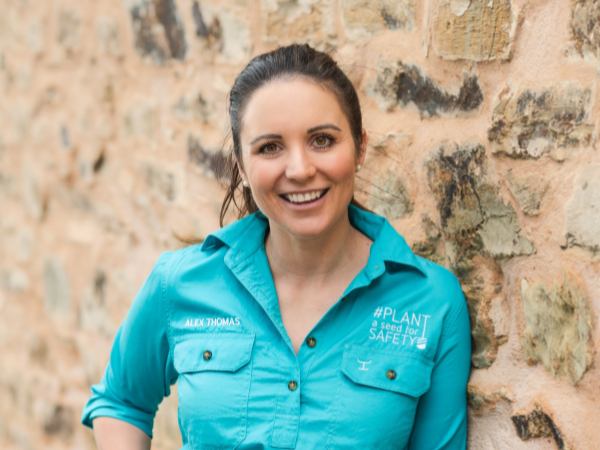Tell me about your business – what do you provide to people in agriculture?
Being a part time carer for my disabled dad inspired me to become a speaker, facilitator, consultant and social entrepreneur, with a diehard commitment to the health, safety and wellbeing of those in rural industries and communities. As a consultant, I help agri-businesses re-think policies, procedures and box-ticking, and cut to the core of what it means to be ‘compliant’ with work health and safety legislation – which put simply – is: just. don’t. kill someone. I’m also the Founder of #PlantASeedForSafety, a rural social change initiative that puts health, safety and wellbeing front of mind, and gets men, women and children home safe and well at the end of each day.
Is this the career you always imagined – and/or is there a key turning point that put you on the path to doing the work that you’re doing today?
No. Way. In. The. World! I desperately wanted to follow in Dad’s footsteps as a station owner, but the drought of ’82, the millennium drought, abysmal wool prices, absurd interest rates and an eventual family breakdown meant the station was to be sold. Throw in the ongoing decline of Dad’s health, and it all sounds pretty miserable – but unbeknownst to me at the time, these events were a divine catalyst for my career in health and safety. I started out in mining, then construction, fishing and oil and gas (amongst others), before eventually making my way ‘home’ to agriculture. The collective impact of drought, family breakdown, the sale of the station, Q fever, Ross River virus, diabetes, heart failure and kidney failure has meant that I’ve been caring for my dad since I was 15 years old, and it’s now my life’s work to prevent what happened to my dad and our family from happening to someone else’s.
What drives the hard work that you do: your passion, your desire to be an instigator of change etc?
Quite simply, I won’t rest until I’ve done everything in my power to prevent what happened (and is happening) to my dad, from happening to someone else’s. A disproportionate number of rural blokes are either lost or critically unwell as a result of working too hard, too fast or for too long without a decent break. I can think of nothing more rewarding than safeguarding the livelihoods of rural men, women and children.
What needs to happen in order to improve health and safety in ag?
For most small family businesses, there’s no invisible line between what’s ‘work’ and what’s ‘home’, and the negative stereotypes associated with work health and safety create significant barriers to improvement. For example, the flow on effect from superseded work health and safety legislation, complex safety management systems used in heavy industry and a largely unregulated safety profession has meant that rather than focusing on the practical things we can do to prevent people from getting hurt, we spend an inordinate amount of time trying to work out what paperwork we *think* we need to satisfy the law. The narrative that work, health and safety is all about policies, procedures and box-ticking is not only uninspiring, it’s dangerous, and sadly many businesses are hamstrung by the fear of being penalised, rather than open to the opportunity to do things differently or better.
We need to realign ourselves with the ‘why’ – that is – to get people home safe and well at the end of each day. To mirror the words of Professor Sidney Dekker, “Safety is an ethical responsibility, not a bureaucratic accountability.”
We need to adjust the way we communicate about health and safety to honour both a) the goal of saving lives (rather than meeting perceived compliance requirements), and b) the nature of our audience. A fear-based, big stick approach to health and safety rarely empowers people to make better choices.
All businesses need to a) define their values (which hopefully emphasise the importance of people), and b) prioritise the management of critical risk. This is as simple as asking the following questions: What could seriously hurt or kill someone? How? And, what are we going to do about it? This will help a business take practical, meaningful action to prevent someone from getting hurt, and by default, demonstrates ‘compliance’.
How has a mostly male dominated industry reacted to you working in this field?
Let’s be honest – there’s lots of people who’d rather poke their eye out with a stick than entertain the topic of health and safety. Enter: a short, white, extroverted 30-something year old female who’s no longer on the land, so in short, it hasn’t been easy!










